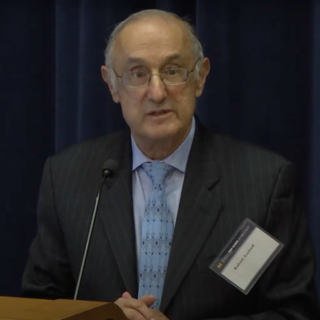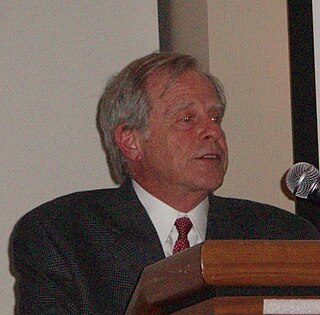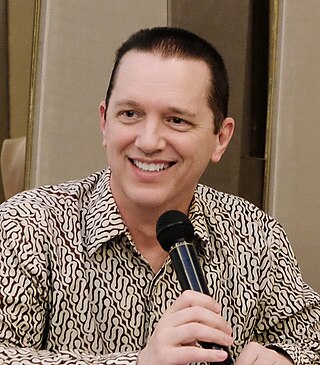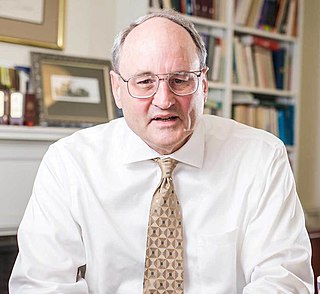Political science is the scientific study of politics. It is a social science dealing with systems of governance and power, and the analysis of political activities, political thought, political behavior, and associated constitutions and laws.

Robert Marshall Axelrod is an American political scientist. He is Professor of Political Science and Public Policy at the University of Michigan where he has been since 1974. He is best known for his interdisciplinary work on the evolution of cooperation. His current research interests include complexity theory, international security, and cyber security. His research includes innovative approaches to explaining conflict of interest, the emergence of norms, how game theory is used to study cooperation, and cross-disciplinary studies on evolutionary processes.
The Fulbright Program, including the Fulbright–Hays Program, is one of several United States Cultural Exchange Programs with the goal of improving intercultural relations, cultural diplomacy, and intercultural competence between the people of the United States and other countries through the exchange of persons, knowledge, and skills. Via the program, competitively-selected American citizens including students, scholars, teachers, professionals, scientists, and artists may receive scholarships or grants to study, conduct research, teach, or exercise their talents abroad; and citizens of other countries may qualify to do the same in the United States.

In political studies, surveys have been conducted in order to construct historical rankings of the success of the presidents of the United States. Ranking systems are usually based on surveys of academic historians and political scientists or popular opinion. The scholarly rankings focus on presidential achievements, leadership qualities, failures and faults. Popular-opinion polls typically focus on recent or well-known presidents.

Theodore J. "Ted" Lowi was an American political scientist. He was the John L. Senior Professor of American Institutions teaching in the Government Department at Cornell University. His area of research was the American government and public policy. He was a member of the core faculty of the Cornell Institute for Public Affairs.
The International Political Science Association (IPSA), founded under the auspices of UNESCO in 1949, is an international scholarly association. IPSA is devoted to the advancement of political science in all parts of the world. During its history it has helped build bridges between East and West, North and South, and has promoted collaboration between scholars in both established and emerging democracies. Its aim is to create a global political science community in which all can participate, most recently it has been extending its reach in Eastern Europe and Latin America. IPSA has consultative status with the Economic and Social Council of the United Nations (ECOSOC) and it is a member of the International Science Council, which brings together over 230 science organizations across the world and actively cooperates with partners from the United Nations system, such as the United Nations Environment Programme (UNEP), the World Health Organization (WHO), and the United Nations Development Programme (UNDP).
The European Consortium for Political Research (ECPR) is a scholarly association that supports and encourages the training, research and cross-national cooperation of many thousands of academics and graduate students specialising in political science and all its sub-disciplines. ECPR membership is institutional rather than individual and, at its inception in 1970, comprised eight members. Membership has now grown to encompass more than 350 institutions throughout Europe, with associate members spread around the world.
Karen Orren is an American political scientist, noted for her research on American political institutions and social movements, analyzed in historical perspective, and for helping to stimulate the study of American political development.
David Collier is an American political scientist specializing in comparative politics. He is Chancellor's Professor Emeritus at the University of California, Berkeley. He works in the fields of comparative politics, Latin American politics, and methodology. His father was the anthropologist Donald Collier.
Norman H. Nie was an American social scientist, university professor, inventor, and pioneering technology entrepreneur, known for being one of the developers of the Statistical Package for the Social Sciences (SPSS). Born in St. Louis, Missouri in 1943, Nie was educated at the University of the Americas in Mexico City, Washington University in St. Louis and Stanford University, where he received a Ph.D. in political science in 1971. He died on April 2, 2015, of lung cancer.
Mathew Daniel McCubbins was the Ruth F. De Varney Professor of Political Science and professor of law, in the Department of Political Science and School of Law at Duke University.

Jeffrey A. Winters is an American political scientist at Northwestern University, specialising in the study of oligarchy. He has written extensively on Indonesia and on oligarchy in the United States. His 2011 book Oligarchy was the 2012 winner of the American Political Science Association's Luebbert Award for the Best Book in Comparative politics.
William G. Howell is an American political scientist and author. He is the Sydney Stein Professor in American Politics at Chicago Harris and a professor in the Department of Political Science and the College at the University of Chicago. He has written widely on separation-of-powers issues and American political institutions, especially the presidency.
Robert Agranoff was an American political scientist and public administration scholar and author. A Professor Emeritus at the Indiana University School of Public and Environmental Affairs, Agranoff was best known for his contributions to the field of collaborative public management and intergovernmental management.

Henry E. Brady is an American political scientist specializing in methodology and its application in a diverse array of political fields. He was Dean of the Goldman School of Public Policy at University of California, Berkeley from 2009–2021 and holds the Class of 1941 Monroe Deutsch Professor of Political Science and Public Policy. He was elected President of the American Political Science Association, 2009–2010, giving a presidential address entitled "The Art of Political Science: Spatial Diagrams as Iconic and Revelatory." He has published academic works on diverse topics, co-authoring with colleagues at a variety of institutions and ranks, as well as many solo authored works. His principal areas of research are on political behavior in the United States, Canada, and the former Soviet Union, public policy and methodological work on scaling and dimensional analysis. When he became President of the American Political Science Association, a number of his colleagues and co-authors contributed to his presidential biography entitled "Henry Brady, Big Scientist," discussing his work and the fields to which he has contributed and has also shaped.

Suzanne Mettler is an American political scientist and author, known for her research about the way Americans view and respond to the government in their lives, and helping to stimulate the study of American political development.
Sarah A. Binder is an American political scientist, author, senior fellow with the Brookings Institution, and professor of political science at George Washington University's Columbian College of Arts and Science.
Mona Lena Krook is an American political scientist. She is a Professor of Political Science at Rutgers University, where she is also the Chair of the Women and Politics Ph.D. Program. She studies the political representation of women, particularly gender quotas in governments and the phenomenon of violence against women in politics.
Shana Alyse Kushner Gadarian is an American political scientist, political psychologist, and educator. She is the Merle Goldberg Fabian Professor of Excellence in Citizenship and Critical Thinking and Chair of the Department of Political Science at the Maxwell School of Citizenship and Public Affairs of Syracuse University. Her co-authored book Anxious Politics: Democratic Citizenship in a Threatening World received the Robert E. Lane Award for being the best book in political psychology published in 2015.






